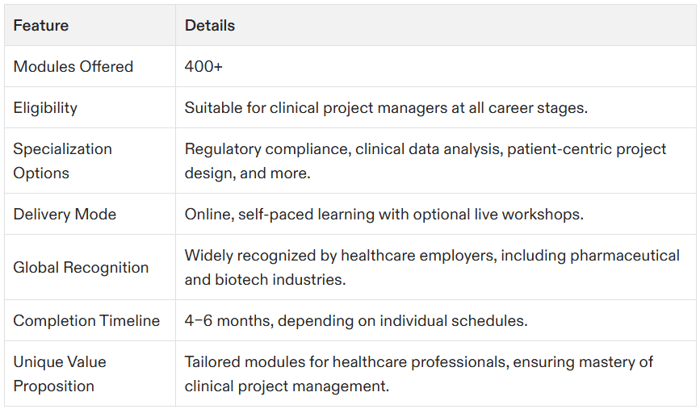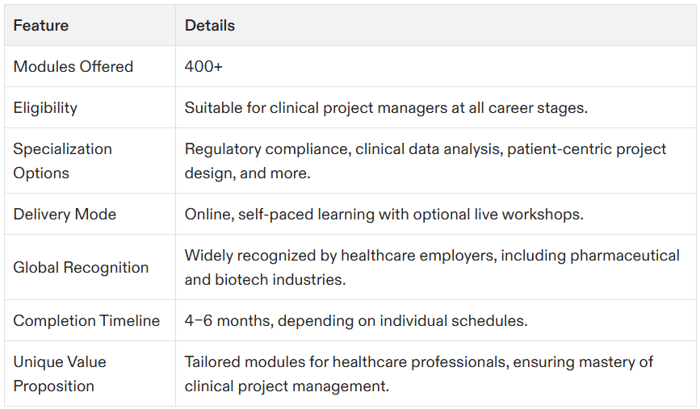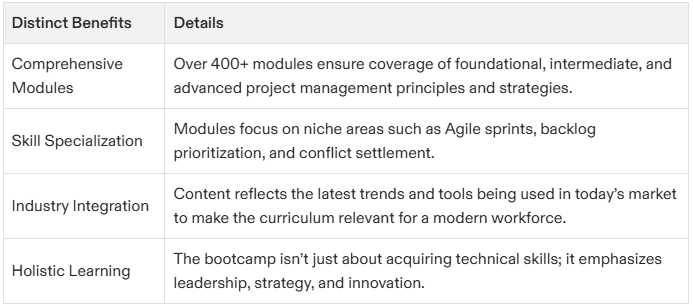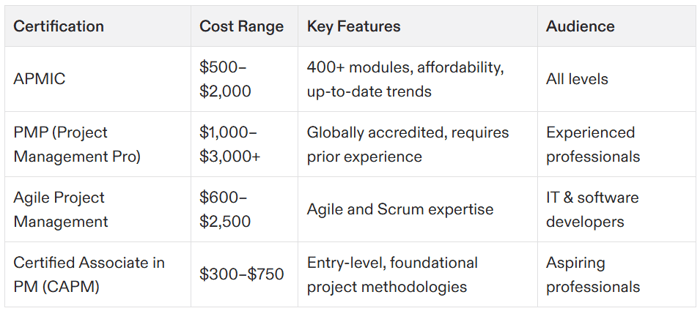Table of Contents
- Introduction
- Why Earn a Clinical Project Management Certification?
- Top Certifications in Clinical Project Management
- Skills You Gain with a Clinical Project Management Certification
- How to Choose the Best Clinical Project Management Certification
- 1. Align with Your Career Goals
- 2. Consider Your Experience Level
- 3. Assess Your Time Commitment
- 4. Evaluate Cost
- 1. What makes these certifications unique?
- 2. Who should consider getting certified?
- 3. Which certification is the most suitable?
- 4. How long does it take to complete a program?
- 5. Are these certifications worth the investment?
- Informative Table about APMIC Certification
- Final Thoughts
Introduction
The healthcare and life sciences industry is evolving rapidly, and the importance of earning a clinical project management certification has never been greater. Whether it's overseeing clinical trials, managing technology implementations in hospitals, or leading regulatory compliance projects, clinical project managers have become indispensable to the sector. These professionals ensure projects stay on track, meet regulatory standards, and ultimately deliver life-changing medical advancements.
One key way to stand out in this high-demand field is by earning a clinical project management certification. This credential arms you with the skills, methodologies, and tools to manage complex clinical projects, regardless of their scale. But with so many certifications available, how do you decide which is the best fit? This guide provides a deep dive into clinical project management certification, outlining its value, top programs, and how to get started.
Why Earn a Clinical Project Management Certification?
1. Develop Specialized Expertise
Managing clinical projects is unlike managing other business initiatives. You’ll handle ethical considerations, regulatory compliance, and clinical data tracking. A clinical project management certification gives you the specialized knowledge to succeed in these challenging scenarios.
2. Boost Your Career Prospects
The demand for certified professionals in clinical project management is growing. Hospitals, pharmaceutical companies, and research organizations actively seek project managers with formal certifications. Having this credential sets you apart in job applications and promotions.
3. Meet Industry Standards
Clinical projects must adhere to strict timelines, budgets, and compliance regulations. Earning a certification ensures you understand these standards and know how to deliver projects that meet these expectations.
4. Increase Salary Potential
Certified project managers consistently earn higher salaries than their non-certified counterparts. Having a clinical project management certification not only adds credibility but also offers negotiating power in salary discussions.
Top Certifications in Clinical Project Management
Choosing the right clinical project management certification depends on your career goals and experience level. Below, we detail some standout programs tailored for professionals in the healthcare and life sciences industry.
1. APMIC Certification
Overview
The APMIC certification is an industry leader, offering over 400 customized modules that cater specifically to clinical project management. It’s designed for professionals working in pharmaceutical companies, hospitals, and research institutions.
Benefits
- Offers detailed learning on clinical trials, regulatory frameworks, and patient safety.
- Self-paced, making it ideal for busy healthcare professionals.
- Globally recognized, offering career mobility across industries and regions.
Learn more about APMIC certification here.
2. PMP (Project Management Professional)
Overview
The PMP certification offers comprehensive training in project management methodologies, such as Agile and Waterfall. While general, it provides valuable tools for clinical project managers, particularly in resource coordination and budget tracking.
Requirements
- Bachelor's degree and 36 months of project management experience, or high school diploma with 60 months of experience.
- CAPM certification or 35 hours of project management education.
Benefits
- Focuses on leadership and resource planning.
- Widely respected and recognized internationally.
3. Certificate in Clinical Trial Management
Overview
This program specializes in trial-specific project management, making it particularly relevant for clinical research professionals. It covers topics like patient safety, trial timelines, and data transparency.
Benefits
- Ideal for professionals specifically working in clinical trials.
- Teaches compliance with FDA, EMA, and other international regulatory standards.
4. ScrumMaster for Clinical Projects
Overview
ScrumMaster certifications are perfect for professionals working in agile, fast-paced environments like biotech or clinical research technology.
Benefits
- Teaches iterative project management tailored for clinical applications.
- Improves team collaboration for continuous progress.
5. CRA (Clinical Research Associate Certificate)
Overview
While focused on monitoring clinical trials, this certificate also provides critical project management insights, making it a good choice for those managing trial operations.
Benefits
- Combines clinical research and project management fundamentals.
- Applicable across diverse research and pharmaceutical settings.
Skills You Gain with a Clinical Project Management Certification
Earning a clinical project management certification equips you with a combination of technical and interpersonal skills highly valued in the healthcare industry.
- Regulatory Compliance: Master the regulations governing clinical trials and patient data.
- Budgeting and Scheduling: Plan resources and timelines effectively in high-stakes environments.
- Stakeholder Communication: Collaborate with sponsors, regulators, and medical teams.
- Risk Management: Mitigate risks related to patient safety and trial delays.
- Data Interpretation: Work with clinical data to make evidence-based decisions.
How to Choose the Best Clinical Project Management Certification
1. Align with Your Career Goals
Do you want to specialize in clinical trials, regulatory compliance, or overall healthcare management? Programs like APMIC allow for customization, ensuring modules align with your professional aspirations.
2. Consider Your Experience Level
If you’re just beginning your career, a foundational program like CAPM might be sufficient. Experienced professionals would benefit more from advanced credentials like PMP or APMIC’s advanced modules.
3. Assess Your Time Commitment
Some certifications, like PMP, require intense study and experience. Others, like APMIC, offer flexibility to study at your own pace.
4. Evaluate Cost
While PMP certifications cost upwards of $1,000, programs like APMIC provide affordable modular learning without sacrificing quality. Flexibility in payment plans can also make certification more accessible.
FAQs About Clinical Project Management
1. What makes these certifications unique?
They are specifically tailored for healthcare and life sciences projects, focusing on critical areas like clinical trials, regulatory standards, and patient safety.
2. Who should consider getting certified?
These programs are ideal for professionals managing healthcare-related projects, such as clinical trial managers, IT leaders in healthcare, or regulatory compliance officers.
3. Which certification is the most suitable?
The APMIC program stands out with its extensive modular approach designed for industry-specific needs, while PMP offers broader project management skills applicable across various sectors.
4. How long does it take to complete a program?
Most can be finished within 4-6 months with consistent effort. Programs like APMIC also allow flexible, self-paced learning for busy professionals.
5. Are these certifications worth the investment?
Without a doubt. They enhance specialized knowledge, validate your skills to potential employers, and open up significant career growth opportunities in healthcare and beyond.
Informative Table about APMIC Certification
Final Thoughts
A clinical project management certification is more than just a credential—it’s a strategic investment in your career. With the healthcare sector's increasing reliance on qualified project managers, certifications provide essential tools to stay competitive and excel in your role.
Programs like APMIC offer unmatched flexibility and specialization, catering to both newcomers and seasoned professionals. Whether you’re managing clinical trials, overseeing compliance projects, or developing innovative healthcare solutions, a clinical project management certification is your ticket to success.
Don't wait—explore the certification programs available today, and take the next step in your clinical project management career!






